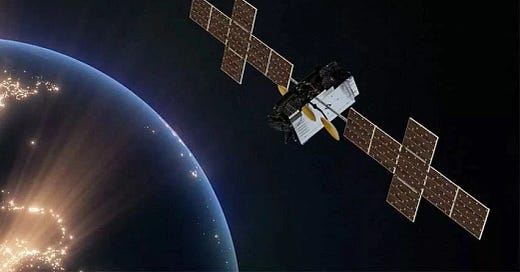The Most Powerful Man in the World—Then and Now
I’ve alluded to this before, but now it needs to take center stage…cm
When CNN first launched, I was at a luncheon where George Soros posed a question to the table, “Who is the most powerful man in the world?”
Everyone went around giving their answers—mostly Reagan, with a few other world leaders thrown in for variety. I don’t remember mine, but I know it wasn’t the right one.
Finally, someone asked George for his take. Without hesitation, he said, “That’s easy. It’s Ted Turner.”
His reasoning? Turner controlled CNN, the only global news network that could instantaneously decide what the world saw and cared about. He didn’t just report the news; he dictated what was news.
I remember reaching for the cookies in the middle of the table, partly because I was processing what he said, and the anxiety screamed for relief, but partly because I realized how stuck I’d been in my own narrow way of thinking, inside the boxes I put things in, and never considering looking for socks in the sweater drawer. Powerful men belonged in government or the military, right? Not media. Not news. Everything and everyone in their place.
But Soros wasn’t thinking inside the box the rest of us were. He understood something that was, frankly, terrifying: if you control what people see, you control what they think. And if you control what they think, you can steer history itself.
And that was with a news channel. Now, fast-forward to today, where Elon Musk controls something far more dangerous: Starlink.
Here’s the problem: If Turner had wanted to manipulate the news for personal gain, sure, he could have tried. But eventually, governments, competing networks, or the sheer force of public scrutiny would have caught up with him.
Musk? Not so much.
With Starlink, he has created a global satellite communication network that underpins everything from military operations to emergency response to, oh yeah, your ability to send a text. Governments rely on it. The U.S. military relies on it. Ukraine literally depends on it to fight Russia. And Musk alone gets to decide who has access.
We already saw how dangerous this is when Musk personally shut off Starlink access near Crimea, reportedly preventing a Ukrainian attack on Russian forces. This wasn’t some policy debate. It wasn’t an international agreement. It was one guy, making a unilateral decision about a war he wasn’t elected to influence.
That should terrify everyone.
The Flick of a Switch—and We’re Back in the Dark Ages.
Here’s what keeps me up at night.
If Musk decides to turn off Starlink, entire nations could go dark.
If he flips the switch, the U.S. military could be paralyzed.
If Starlink shuts down, you might not even be able to make a phone call.
Yes, your Apple phone. Yes, Verizon and AT&T. Starlink isn’t just for rural broadband—it’s integrated into our entire communications infrastructure.
Unlike Halliburton under Cheney, which profited from war but never had the ability to end one, Musk has something even scarier: a literal kill switch for global communication.
And somehow, we thought this was a good idea?
This is the part I still can’t wrap my head around.
Why would we pay a vendor to build something as vital as Starlink and then… not own it? Why didn’t the U.S. government—or at least NATO—ensure we had control over a system so critical to national security?
Instead, we’ve handed the entire thing over to a guy who tweets conspiracy theories at 2 a.m. and whose politics seem to shift depending on the last podcast he listened to.
And it’s not just a U.S. problem. Europe, you need your own satellites yesterday. The EU should be launching its own network right now, because if you think Musk is a reliable partner in geopolitics, you haven’t been paying attention.
Okay, so you’re reading this and thinking, Great. Now I have something else to panic about. Thanks a lot.
But I’m not just here to sound the alarm. I’m here to say we need a Plan B.
For governments, that means creating independent, government-controlled satellite networks. We need redundancy, and we need it fast.
And, for regulating Starlink. No single person—no matter how “genius”—should be able to unilaterally shut down global communications. This is a job for Rachel Maddow.
For us mortal citizens who feel we have no agency? We have to have an offline communication plan. If things go dark, where do you meet your family? How do you get information?
We need to Consider alternatives. If your internet, phone, and banking systems all rely on Musk playing nice, you might want to diversify your options.
Am I Becoming a Conspiracy Theorist?
I’ll admit it—I’ve always side-eyed conspiracy theorists. I work with someone who firmly believes the CIA killed JFK, and while she makes a compelling case, I’ve always been skeptical. But now?
Now, I’m starting to wonder if this is how it happens.
Because this isn’t some deep-state fever dream. This is happening, in real time, in plain sight. We have handed our digital lifelines to one man, and we are one bad mood away from seeing what happens when he decides to cut the cord.
If you haven’t watched Paradise on Hulu, do yourself a favor. Seeing this kind of scenario play out on screen makes it feel even more real than when I’m sitting here typing it.
But whether you believe me or not, here’s what I ask:
Talk about this.
Make sure people understand that Starlink isn’t just a nifty way to get WiFi in rural Montana. It’s the infrastructure for global communication and war. And right now, it’s controlled by one man with no oversight.
I wish I’d asked George Soros at that luncheon what the antidote was for this kind of situation. But since I didn’t, I guess I’ll have to figure it out—and get back to you.




